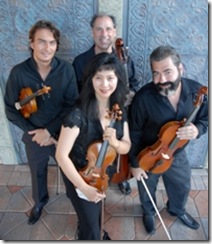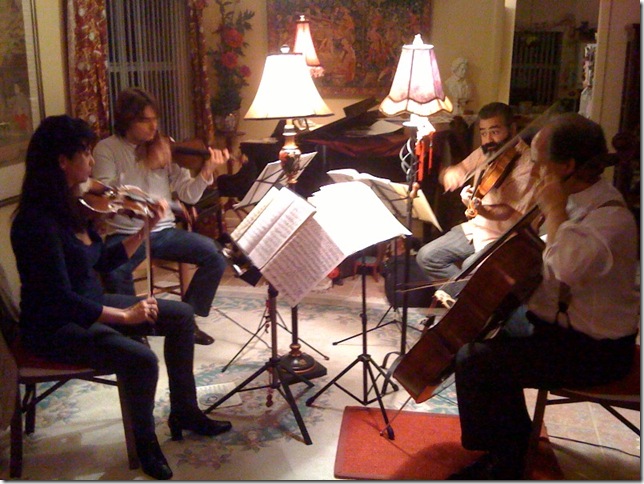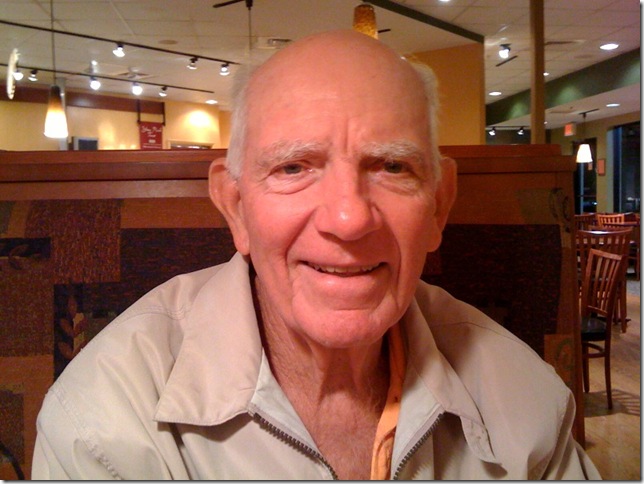It’s difficult to predict what will happen years down the road in any arts endeavor, given the vagaries of unreliable economics and audience taste.
But for the foreseeable future, there will be a Delray String Quartet in some form or another. Founder Don Thompson won’t have it any other way: He’s already set aside a chunk of money in his will to keep the foursome going.
“It’s going to be here forever,” he said.
Now in its sixth season, the Delray String Quartet is making a move that runs contrary to the economic times by expanding its reach beyond Palm Beach County into Broward and Miami-Dade counties. It’s also added an appearance during the season in Wellington, all at venues far from its home at the historic Colony Hotel in downtown Delray.
Bankrolled by Thompson, 75, a New York businessman who made good in the aerosol industry and in the 1980s became co-producer of The Fantasticks, the longest-running Broadway show in history, the Delray is performing each of its five concerts three times: Friday nights in Coral Gables, Saturday nights in Fort Lauderdale, and Sunday afternoons back home at the Colony.
It opens its new season tonight at St. Thomas Episcopal Parish in Coral Gables with the Quartet No. 4 (in C minor, Op. 18, No. 4) of Beethoven, and the tempestuous Piano Quintet in F minor of Cesar Franck, with guest pianist Tao Lin.
It’s a heady thing for the quartet, which has just signed its third cellist in as many seasons. Claudio Jaffé, 48, a native of Brazil who has worked in South Florida for years, takes the cello spot previously occupied by Ian Maksin and Susan Bergeron, and in so doing makes the Delray a four-continent quartet.
First violinist Mei-Mei Luo hails from Shanghai, while second violinist Laszlo Pap is a native of Budapest. The lone native of the United States is violist Richard Fleischman, 46, a New Yorker who also conducts and spends much time on the summer music scene in Santa Fe, N.M.
Fleischman said Thompson doesn’t expect rapid acceptance of the quartet in Broward or Miami-Dade and is content to let it build slowly. But the foursome is working hard to get the word out.
“We as quartet members are doing everything we can to promote ourselves,” Fleischman said in an e-mail. “Hopefully, word of mouth will bring in the audiences.”
The Delray String Quartet rose out of the ashes of the Florida Philharmonic, which played its last concert in May of 2003. Luo was the concertmaster for that final performance, and not long after, Thompson approached her about founding a quartet after he hired her and another violinist to provide background music for a party he was holding.
“I said: ‘Why don’t you get a viola player and a cello player, and do a quartet? We’ll do five concerts at the Colony and I’ll underwrite it,” Thompson said. “And she said, ‘I love it.’
The first iteration of the quartet debuted in late 2004 at the Colony, with Luo and Pap in the violin chairs, Debra Spring as violist, and Maksin on cello (with Bergeron filling in for him on at least one occasion).
Spring broke her arm shortly thereafter and was replaced by Dmitri Pogorelov, who also suffered an injury during the 2005-06 season. Fleischman took over at the last minute, and was asked to stay. Maksin played the first four seasons, and then relocated to Chicago. Bergeron replaced him for the fifth season, but because of commitments with the Naples Philharmonic was unable to play the expanded dates for the sixth season, which brought the quartet to Jaffé.
The newly reconstituted quartet, judging by its work during rehearsal recently at Luo’s home in Davie, is a collegial group of professionals who know their business and are willing to try a variety of approaches to get the best result.
During the rehearsal of the Franck quintet, the mood was efficient and fruitful, but also light. At one point, Lin and Fleischman discussed the markings in their respective scores during one very soft passage.
“That’s where you hold your pedal down and stay quiet,” Fleischman says.
“That’s my job description,” Lin says, as everyone laughs.
Later, Luo works on the big triple stops in the opening of the Beethoven Fourth Quartet after Fleischman suggests they sound like they were coming in a trifle early. She practices them and the quartet tries those passages again several times in a bid to get the timing just so.
All in a day’s rehearsal, Fleischman said.
“We are all working towards the same goal and even when we get slightly frustrated, we all know that we have great mutual respect for each other as artists,” he said.
Jaffé, who teaches at Boca Raton’s St. Andrew’s School, said in an e-mail that the string quartet literature “includes some of the most profound, sublime, boisterous, complex, delightful pieces” by some of the greatest composers in history, and that makes chamber music special.
“The feeling of becoming one with the other musicians, breathing together, phrasing together, sometimes having a carefully worked-out plan, sometimes making something happen spontaneously on the spot, is really exhilarating,” he said.
In late 2008, the quartet (with Maksin in the cello seat) released its first disc, an all-Dvorak record featuring two of the Czech master’s most well-known chamber works, the String Quartet No. 12 (in F, Op. 96, American), and the Piano Quintet in A (Op. 81) , which it recorded with Lin. Thompson took the players down to the Hit Factory in Miami (former the legendary Criteria Studios, whose honor roll of clients includes Bob Dylan, David Bowie and Bob Marley, among many others) to record the disc, and said the recording was subjected to painstaking hours of editing.
“That CD is good because it’s been edited,” said Thompson, who studied composition for two years with Julliard’s Stanley Wolfe while living in New York. The disc already has helped the quartet win some new friends, said Thompson, including some concert promoters who want the quartet to play a gig next year in Jacksonville. 
Earlier this year, the quartet reached another milestone when it played a piece composed especially for it: the String Quartet No. 3 by Thomas Sleeper, a longtime faculty member at the University of Miami. The Delray acquitted itself admirably with the intense, difficult work, and a recording of the work is still a possibility when the group returns to the studio next year.
Looking ahead to next season, preliminary plans are to include one American work on each of the programs, Fleischman said. Under consideration are quartets by Walter Piston, David Diamond, Quincy Porter, Randall Thompson and Kenneth Fuchs, he said.
Don Thompson, who once provided the libretto for an oratorio by Alan Hovhaness, clearly admires the members of the Delray. “These musicians are so good. I can give them anything and they can do it,” he said, referring to some custom arrangements he’s had prepared for the foursome.
He also is a great fan of the string quartet genre.
“Every great composer thought a lot of them. Everyone of them. They all thought it was hot stuff,” said Thompson, whose budget for the quartet this season will top $30,000. “The string quartet is almost like an orchestra. It’s like a solo for four instruments, if you think about it. It’s really like a concerto for four instruments.”
By going into Broward and Miami-Dade, the quartet enters the territory of two long-established quartets, both of whom have played concerts in Palm Beach County: The Bergonzi Quartet, resident at the University of Miami, and the Amernet Quartet, resident at Florida International University. That doesn’t seem to bother Thompson or the quartet.
“People are not so different in Broward and Dade,” Pap wrote in an e-mail. “So, we will play well and people will like us. The rest is all about marketing.”
Jaffé said in a phone conversation that “one of the key words here is ‘patience.'”
“We may not have full houses right away, but the people who go to classical music concerts will appreciate it,” he said. “They’re going to talk to each other and audiences are going to find out about us.”
The Delray String Quartet will appear at 7:30 p.m. tonight at St. Thomas Episcopal Parish in Coral Gables, and at 8 p.m. Saturday at All Saints Episcopal Church in Fort Lauderdale. Tickets for these performances are $20. The quartet also will play its program of Beethoven and Franck at 4 p.m. Sunday at the Colony Hotel in Delray Beach. Tickets for this performance are $35. All concerts will feature a pre-concert lecture by Richard Fleischman one half-hour before the music begins. For more information, call 213-4138 or visit www.delraystringquartet.com.

